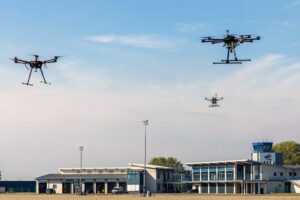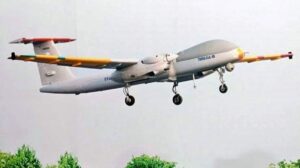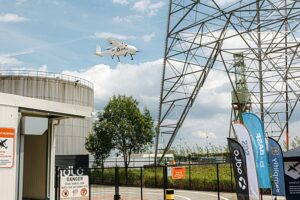The proposed ban on DJI drones in the U.S. has sent shockwaves through the drone enthusiast community. Many drone pilots (or wannabe drone pilots) these days are wondering if they should still buy a DJI drone given the news.
Fear not, aspiring aerial photographer or weekend drone videographer. Before you shelve your drone dreams, let’s delve into the situation and see if there might actually be a buying opportunity here. As it turns out, now might be the best possible time to buy a DJI drone.
Should you still buy a DJI drone amidst a possible DJI ban?
What to know about the proposed ban on DJI drones in the U.S.
A federal law already exists that restricts government agencies from using DJI drones due to security concerns.
The potential civilian-use ban that’s hot in the news today (and is one of the most debated pieces of legislation in the U.S. drone industry ever), called the “Countering CCP Drones Act,” could be a game-changer.
So what is the Countering CCP Drones Act? Introduced by Republican Representatives Elise Stefanik (R-NY) and Mike Gallagher (R-WI), it specifically targets Shenzhen Da-Jiang Innovations Sciences and Technologies Company Limited (the Chinese drone maker commonly known as DJI Technologies).
The bill proposes a wide-ranging ban on new drones manufactured by DJI, ultimately preventing new DJI products from coming to market in the United States. To do that, the legislation could add DJI to a Federal Communications Commission’s (FCC) Covered List, potentially prohibiting future DJI drones from operating on U.S. communications infrastructure and in turn rendering them moot from flying — and not much more useful than a paper weight.
A version of the Countering CCP Drones Act was included as part of the National Defense Authorization Act (NDAA FY25), which passed in June 2024 the U.S. House of Representatives by a narrow margin that fell along party lines. The next step is the Senate, which is majority led by Democrats. Given that, it’s less likely the ban — which echos other Republican-led, anti-China sentiment (such as a proposed TikTok ban) — would necessarily pass in the Senate.
Read the full text of the National Defense Authorization Act (HR 8070) here. It’s more than 1,000 pages long, but the section pertaining to the DJI ban is in SEC. 1722, on page 726.
So with that in mind, is now a good time to buy a DJI drone?
The ban may only apply to new drones
Here’s the key detail: it might only restrict the sale of new DJI drones — which seems to be the most likely outcome. The wording is actually quite vague.
Under section b, it states that DJI’s telecommunications and video equipment, including software, from DJI would be added to the Defense Department’s Section 1260H List of “Chinese Military Companies” alongside the current list of about 50 other Chinese companies.
Even if it does pass, it’s unclear though, how the FCC would actually implement this. The FCC could grandfather current drones. It could also choose to make some sort of grace period before outright banning drones. Ultimately, the FCC would have more authority to decide. Some experts have said the ban would not apply to existing drones, but the current text is pretty vague, so it’s difficult to say for sure.
With that, here are some reasons for — and against — the decision to buy a DJI drone in 2024:
DJI drones are cheap right now
It’s never been a more affordable time to get a quality DJI drone at a low price. DJI is actually in the midst of its half-yearly sale right now, offering discounts on its own site as well as reputable third parties such as Amazon and B&H Photo, or authorized retailers such as Drone Nerds.
And in general, DJI prices have been trending lower. For example, the Avata 2 FPV drone launched in April 2024 for $999 for the starter kit. Compare that to perhaps its closest sibling drone, the DJI Avata. The older model launched in August 2022 at $1,168 for the equivalent kit. That’s a 15% price decrease for DJI’s newest FPV drone at the time in roughly two years.
And compare that to the general rate of inflation, which — between that same period from August 2022 to April 2024 — is up a whopping 6.1%.
It’s pretty incredible to see DJI dropping its prices, particularly when prices for pretty much everything else are going up.
You might end up with a rare commodity
Assuming the ban goes through and the FCC doesn’t block existing DJI drones from operating in the U.S., you’d still be able to soar through the skies with your trusty DJI companion (of course, following FAA regulations as always).
And if the ban goes through, existing DJI drones could become more valuable as new ones become scarce.
Imagine snagging a pre-owned DJI Mavic Air 2 today and flipping it for a profit later through a reseller like eBay. Yes, selling used drones can be a somewhat lucrative way to make money. Here’s where the “gold rush” aspect comes in. You could potentially snag a bargain on a quality drone now, then benefit from its increased value if the ban materializes.
A well-maintained DJI drone could be a fantastic long-term investment, especially if the ban materializes and existing models become collector’s items. With proper care, your DJI Phantom might transform from a recreational flying companion to a valuable piece of tech (and a potential conversation starter at drone enthusiast gatherings).
Why buying a DJI drone right now might be a bad idea
f the Countering CCP Drones Act passes and applies more broadly than anticipated, it could render your brand new DJI drone unusable. But that’s not the only reason why you might not want a DJI drone:
Businesses might not want you using DJI drones
Outright ban or not, the talk alone of a DJI ban could have ripple effects on the business of Part 107-certified drone pilots who take on contract work. If your potential client requires the use of a non-DJI drone for security reasons or out of principle, being solely equipped with DJI models could put you at a disadvantage in securing those contracts.
Support might be lacking going forward
Additionally, with the potential for alternative drone manufacturers to gain market share due to the potential ban, you might miss out on the latest features or innovations from competing brands if you rush into a DJI purchase now.
If a ban goes through, we might see an end of firmware and software updates to DJI, providing for a less optimal (and potentially buggy) experience.
Plus, companies that currently offer to repair drones might stop supporting DJI drones.
Consider DJI alternatives
We don’t have a crystal ball, so it’s impossible to say what will happen to DJI going forward. That said, risk-averse drone pilots in the market for a new aircraft might be best off with a DJI alternative. They might not offer the same brand recognition or user experience as DJI, but they can at least fill some of what could be a DJI void.
Among the best, affordable options include the Crazyflie Nano drone made by DroneBlocks. For a camera drone, consider the HoverAir X1 or Autel EVO Nano+.
And on the enterprise end, high-quality drones (with high price tags to match) include the Freefly Astro Prime drone, the Parrot Anafi USA drone and the Sony Airpeak S1.
So with that, what say you? Are you seizing the moment to nab a DJI drone right now? Or are you holding off to see what happens? Tell me in the comments!
The post To buy or not to buy a DJI drone: Navigating the proposed DJI drone ban appeared first on The Drone Girl.
 With a view to testing the use of drones in offshore wind farms, the German Aerospace Center (Deutsches Zentrum für Luft- und Raumfahrt; DLR) will be using a geo-zone at the National Experimental Center for Unmanned Aircraft Systems in June 2024 to expand drone operations in the open category. The establishment of this special geographical […]
With a view to testing the use of drones in offshore wind farms, the German Aerospace Center (Deutsches Zentrum für Luft- und Raumfahrt; DLR) will be using a geo-zone at the National Experimental Center for Unmanned Aircraft Systems in June 2024 to expand drone operations in the open category. The establishment of this special geographical […] With a view to testing the use of drones in offshore wind farms, the German Aerospace Center (Deutsches Zentrum für Luft- und Raumfahrt; DLR) will be using a geo-zone at the National Experimental Center for Unmanned Aircraft Systems in June 2024 to expand drone operations in the open category. The establishment of this special geographical […]
With a view to testing the use of drones in offshore wind farms, the German Aerospace Center (Deutsches Zentrum für Luft- und Raumfahrt; DLR) will be using a geo-zone at the National Experimental Center for Unmanned Aircraft Systems in June 2024 to expand drone operations in the open category. The establishment of this special geographical […]






